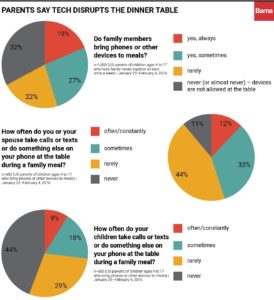Practically everyone these days is concerned (if not annoyed) by the way youth seem to be addicted to technology.

Andy Crouch
Millennials catch a lot of flak for constantly being on their smartphones, and research shows that parents feel it’s harder than ever to raise children due to the pervasiveness of social media, gadgets and games of all sorts.
But could it be that when it comes to technology, adults are merely casting the first stone?
“This is a huge issue,” said Andy Crouch, author of The Tech-Wise Family: Everyday Steps for Putting Technology in Its Proper Place.
“People are worried about children on devices, but I worry about parents on devices – and so do kids,” he said.
In an interview with Baptist News Global, Crouch discussed the impact technology is having on generations, faith, family life and childhood development.
Trends are concerning, he said, and their solution must begin with adults, he said.
Children often agree. When asked, they often tell researchers they wish their parents spent less time on phones and more time engaging with them, Crouch said.
It can send powerful, unhealthy messages to youth.
“Ultimately it’s about us, the adults, and how we choose to use these things.”
Providing practical solutions to the challenges posed by technology is the goal of The Tech-Wise Family Challenge, a 21-day online program for individuals and families.
The plan, which launches today, includes daily e-mail exercises on how to improve awareness around technology habits and how to be more intentional in using phones, tablets and other devices in ways that contribute to building character and relationships, Crouch said.
“This is not a 21-day fast from all screens,” he added. “It focuses on how technology changes us and asks us what we want our family to be.”
Statistics provided by Barna suggest there may be plenty of demand for some kind of thoughtful approach to the rapid spread of technology.
The organization found that 46 percent of parents surveyed said phones or other devices “always” or “sometimes” disrupt family meals.
Barna said 88 percent of teens and 48 percent of pre-teens have phones.
Parents also were asked how often they or their spouse take calls or texts during family meals. Barna reported that 12 percent constantly do, and 33 percent sometimes do.

“Sixty percent of U.S. adults say they never step away from social media,” Barna reported.
Crouch said he agrees with parents who claim that technology makes it harder than ever to raise children.
Devices have become so prevalent and have made most tasks so easy that children are not learning a lot of basic life skills anymore, he said.
“These devices appeal to our appetites, to the most basic things we want, to our sense of belonging, satisfaction and fulfilment,” Crouch said.
Tools and instruments require the development of wisdom and training to use effectively.
“Devices are not good for developing wisdom and courage,” he said. “What we need to do is turn our devices into instruments by using them for a purpose, so they can help us develop.”
A smartphone can be used to play games, or it can be used for academic and intellectual development.
Faith and spirituality can also be hindered or furthered by technology, Crouch said.
A parallel is apparent in the Garden, when Adam and Eve chose the route of instant knowledge.
“That’s the basic promise of devices,” he said. “Without you having to change and grow or submit, you’ll have what you want.”
Preoccupation with devices also diminishes time and attention from Christians’ ability to love their neighbors as themselves.
For individuals and families to buck those trends requires seeing how technology is – and should be – operating in their lives.
It might require not handing a screen to comfort a crying child or mom and dad not keeping smartphones at the dinner table.
“We have to choose,” Crouch said. “We have to train ourselves to make harder, better choices.”


